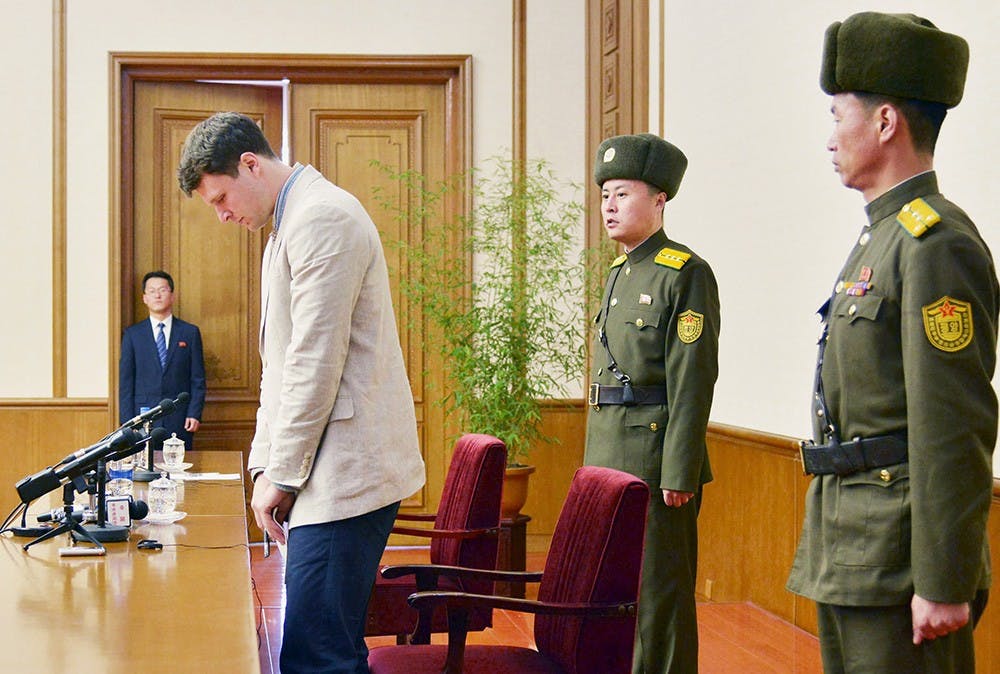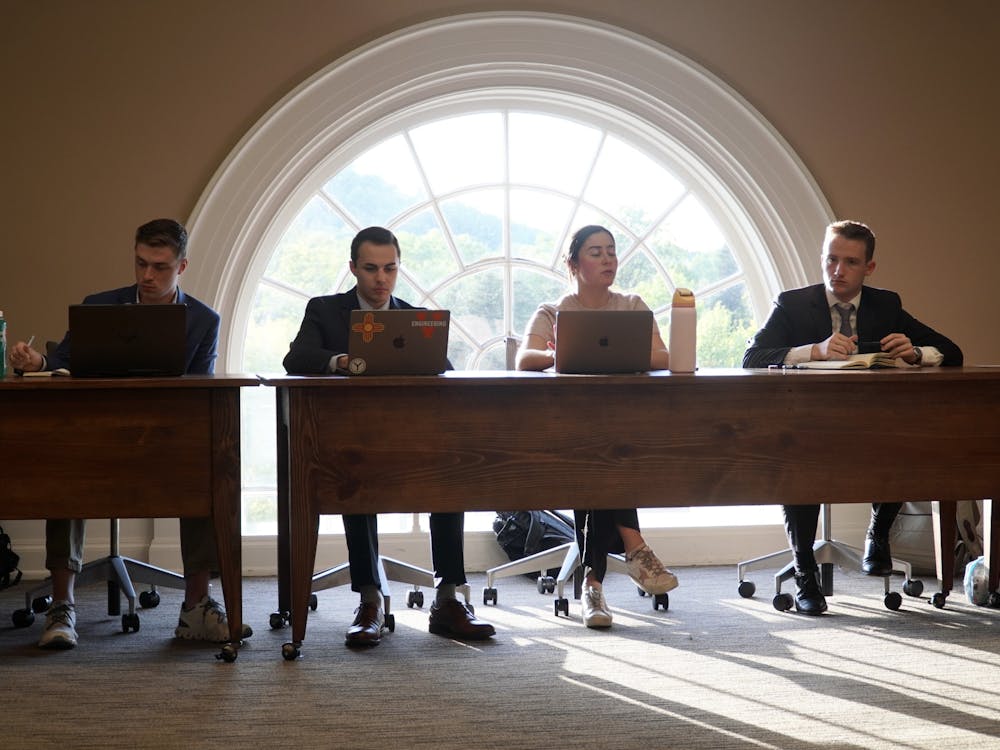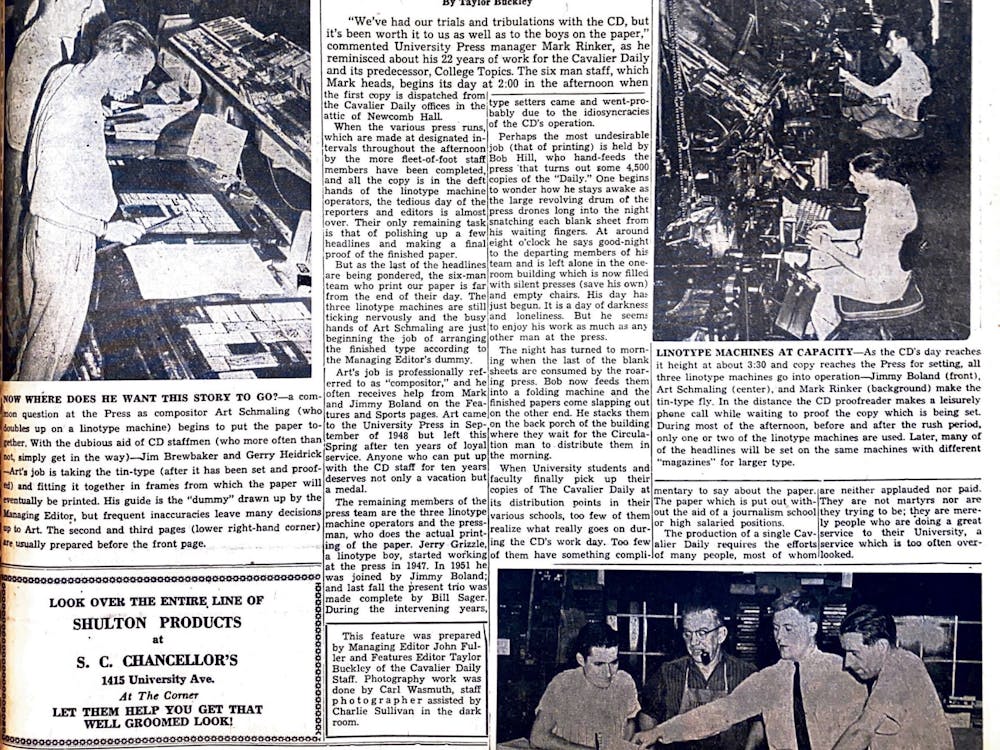After over three months of detainment, third-year Commerce student Otto Warmbier remains held in North Korea following a March 16 trial before the North Korean Supreme Court.
During the trial, Warmbier confessed to stealing a political banner, and the Democratic People’s Republic of Korea’s highest court sentenced him to 15 years of hard labor for subversion.
In a press conference Feb. 29, Warmbier admitted to attempting to take a political slogan from the Yanggakdo International Hotel in Pyongyang, where he was staying with Young Pioneer Tours.
“I committed the crime of taking out a political slogan from the staff-only area of the Yanggakdo International Hotel,” Warmbier said. “The slogan inspires the Korean people's love for their system.”
At the trial, the North Korean government presented security camera images of Warmbier attempting to steal a banner Jan. 1, according to Reuters.
The banner — which is partially censored in photos presented at the trial and features bold white letters against a red background — reads, "Let's firmly arm ourselves with Kim Jong-il patriotism!”
Kim Jong-il was the father of North Korea’s current Supreme Leader — Kim Jong-un — and ruled the DPRK from 1994 to 2011. Kim Jong-un is the heir of the Kim “dynasty,” which his grandfather — Kim Il Sung — started when he created the North Korean regime in 1948.
Reuters reported the DPRK also introduced evidence allegedly matching Warmbier’s fingerprints to those on the banner and that a hotel staff member testified against Warmbier at the trial.
“A cult of personality”
Experts and scholars of North Korea agree the banner Warmbier allegedly attempted to steal is a common form of domestic propaganda. Moreover, slogans, images and materials invoking the names of the Kim family are considered sacred in North Korean culture.
David Straub, associate director of the Korean Program at the Asia-Pacific Research Center at Stanford University, said the banner is just one example of many displays of political slogans in the DPRK.
Straub visited North Korea as part of former President Bill Clinton’s delegation in 2009 to free detained American journalists Laura Ling and Euna Lee.
“Outside they have huge banners all over the place and placards and statues,” Straub said. “Especially the capital city of Pyongyang — it’s just full of all sorts of political slogans plastered on various types of things, so this is very common.”
Scott Snyder, senior fellow for Korea Studies and director of the Program on U.S.-Korea Policy at the Council on Foreign Relations, said the slogans also appear in the North Korean countryside, workplaces and in state media.
“I would say that you would probably find [political slogans] in almost any building in North Korea,” Snyder said.
Slogans range from discussing scientific achievements and agriculture to the Kim family’s legacy and the military.
In February 2015, for example, the Central Committee and the Central Military Commission of the Workers' Party of Korea published over 300 slogans.
One slogan approved in 2015 is similar to the slogan on the banner Warmbier allegedly attempted to steal: “Let us step up the building of a prosperous country by applying Kim Jong-il's patriotism!”
Snyder said the purpose of these slogans is to control political thinking.
“The DPRK uses slogans in order to try to assert political control and guide the parameters of thinking politically among the North Korean people,” Snyder said. “These slogans are really … a means by which to define the direction and limits of political thought in North Korea.”
Straub said the banners are part of “the world's most extreme cult of personality existing today.”
This “Cult of Kim” is an essential part of understanding North Korean identity and why the banner Warmbier allegedly attempted to steal resulted in what Westerners might consider to be a harsh sentence.
Jean Lee, a global fellow with the Washington, D.C.-based Woodrow Wilson International Center for Scholars, said North Korea under the Kim family can be compared to a monarchy, with the Kims as the royal family.
Lee — who who founded the first U.S. news bureau in Pyongyang for the Associated Press in 2012 and currently teaches North Korean studies at Yonsei University in Seoul — said a comparable example for Westerners to consider when looking at the North Korean system is the Tudor dynasty in England, which ruled the British empire in the 16th century.
“If you look at the Tudor era, for example, the way that they treat[ed] Henry VIII, [the way he] treated his people and the way that he was regarded would be very similar to what you see in North Korea today,” Lee said. “So speaking out against the leader, opposing the leader, anything like that would be considered a serious crime.”
The leadership in North Korea — and anything bearing the name of members of the Kim family — is considered sacrosanct, Lee said.
Inside North Korean homes, for example, it would be unusual to find family photographs hanging on living room walls. Instead, portraits of the leaders — who are often regarded as family members — are found in living rooms. Families refer to the leader as “father,” Lee said.
These portraits of the Kim family members are considered valuable possessions.
“The North Korean media has made heroes of ordinary North Koreans who, for example, when their house is accidentally burned down, they run inside and retrieve the obligatory portraits that hang on their walls of these Kim Jong-un leaders,” Straub said.
Although the sacrosanct nature of Kim family portraits might seem unusual to Americans, the context may be similar to the practice of hanging religious symbols — such as crucifixes or portraits of Jesus — in some American homes, Lee said.
“Certainly in certain religions and certain families in America, that wouldn’t be so out of place,” Lee said. “You can imagine that if your house were burning down, there would be some people who would grab a portrait of Jesus — they would probably feel like that would be wrong to let that portrait burn down with the house.”
In this cult of personality that has developed, members of the Kim family are treated as “demigods,” Straub said.
Following the death of Kim Jong-il in 2011, for example, one report from the Korean Central News Agency — the official state media of the DPRK — noted that “His immortal exploits will always win [the North Korean people’s] admiration.”
Another example of the reverence for the Kim family is found through how North Koreans interact with newspapers.
On Lee’s first trip to North Korea, she said was told if she ever received a North Korean newspaper, it would be be dangerous to crumple it up or throw it away because “the leader is prominently featured on every single page of the paper, and so by crumpling up the paper, you would be committing a crime.”
“Building a cult-like political culture”
The cult of personality in North Korea developed under the rule of Kim Jong-un’s grandfather, Kim Il Sung, and is the result of various factors, including Korean history and foreign influences.
“One of the things Kim Il Sung did was really borrow on Korean history to … build this regime and hold on to power, and to build an ideology that he thought would keep the country together,” Lee said.
This ideology of North Korean socialism was influenced by a history of feudalism and monarchical rule in Korea, as well as Christianity and the communist precepts of Karl Marx and Vladimir Lenin.
Kim Il Sung grew up in a Christian family and “borrowed quite a bit from the kinds of religiosity that he must’ve known as a child,” Lee said.
Lee said the current cult of personality developed in the 1970s as a strategy to unify the nation and is an extension of these historic influences.
Straub said Kim Il Sung’s cult of personality — mirroring that surrounding Joseph Stalin and Mao Zedong — was passed on to Kim Jong-il and Kim Jong-un.
Snyder also said the personality cult has foreign influences in China and the former Soviet Union.
“The personality cult really derives from the [19]60s and was borrowed to a certain extent from China, from Mao Zedong — it’s just that the North Koreans never abandoned it,” Snyder said. “And the bureaucratic structure within North Korea has parallels with the Chinese political structure during the Cultural Revolution, and also their bureaucracy borrows from Stalin’s template.”
During the Cultural Revolution of the 1960s, members of the Chinese Community Party spied on one another for disloyalty to the government and millions of people were persecuted.
The slogans on the banners are directed at the North Korean people and are intended to quash dissent, Straub said.
“The North Korean leaders in fact feel insecure in regards to their own people because the leaders know how much they are — to some extent — how much they have lied and abused their own people and how much, therefore, they need to control them and engage in sort of a cult-like political culture,” Straub said. “Building a cult-like political culture is part of the control methods.”
Lee emphasized the need to view these methods in the context of North Korea’s history.
“It’s not that far off from South Korea in some respects because it does draw from its own heritage,” Lee said. “For [people] from the West, it’s not a part of your heritage so it seems very odd, but having [a] monarchy, living under colonial rule — there are many elements of its history that contributed to the making of modern North Korea.”
Surveillance, at home and at work
Surveillance, whether in the form of people watching one another or electronically via cameras, in North Korea and demonstrations of loyalty are a part of everyday life in North Korea.
“People are under constant surveillance. That is a part of society in North Korea,” Lee said. “As you probably saw, the evidence used against [Warmbier] was the CCTV footage.”
Straub said the North Korean system of domestic surveillance is based on the system utilized by the U.S.S.R.
“Originally, the North Koreans copied the Soviet style control system, which is built on neighbors spying on each other,” Straub said. “So every 10 households will be organized into a group and one of the people — usually a housewife — will be given responsibility for overseeing those 10 families and to reporting anything [disloyal to the state] that any of the family members do.”
People will get in trouble, for example, if they don’t have photographs of the Kim family hanging on their wall or if the photographs are not dusted properly, Straub said.
Straub said this system is accompanied by intelligence, police and internal security agencies.
The surveillance also extends to North Korean workplaces, Snyder said.
“At both the workplace, and in a home context, there will be a designated representative that monitors others within that particular group and reports up the chain to party officials about what’s happening in the group,” Snyder said. “We don’t necessarily have a good picture of this, but there are probably multiple lines of surveillance like this, so the watchers also are being held accountable by people who are watching them.”
There are weekly gatherings at workplaces for North Koreans to cultivate and enforce loyalty and patriotism.
“There is a room in virtually all North Korean workplaces where North Koreans associated with that unit gather in order to study the slogans, make confessions of thoughts that have been inconsistent with the slogans and messages and really designed to keep people headed in a direction of support and loyalty for the leadership,” Snyder said.
The banner Warmbier allegedly attempted to steal was in one of these areas designated for staff at the Yanggakdo International Hotel.
“It would be equivalent to an employee break room, which we have in America as well,” Lee said. “Every office has a break room where you might have company policies or you might have federal regulations or somebody might put up the office pool for the Super Bowl or something like that.”
The meetings that occur in staff areas of workplaces — which also occur with neighborhood associations — are a “burlesque” of religion, Straub said.
“They have to confess to their sins, quite literally,” Straub said. “They have to say where they’ve fallen short of being a good follower of the Kims.”
Snyder drew comparison between the surveillance in North Korea and the Stasi, which was the public security arm of the East German government during the Cold War that involved neighbors and family members spying on one another.
“This is a system that is more extensive that what we learned about the Stasi after the end of East Germany. I think the North Koreans have implemented that system more rigorously,” Snyder said.
When the Stasi records came out, the East Germans learned that more people were reporting to the party officials than they had even realized, Snyder said.
In an email statement, Straub said the government’s policies have “probably made most North Koreans feel that they must report on others, whether out of conviction or in fear of punishment.”
“An emerging trend”
Experts say North Korea’s sentence of Warmbier to 15 years of hard labor for allegedly stealing the banner is part of a trend in North Korean-American relations.
“I think that what we’re seeing is an emerging trend within the DPRK, really in some respects starting with Kenneth Bae, of the DPRK holding trials and imposing harsh sentences on foreigners who are convicted in their system of violating their laws,” Snyder said.
Bae was held in North Korea for two years and was sentenced to 15 years of hard labor for preaching Christian teachings in opposition to the DPRK. He was released in 2014.
A total of six Americans — including Warmbier — have faced trial in North Korea, and their sentences have ranged from six to 14 years. The length of time between trial and release for former detainees ranges from 56 to 556 days.
Charles Armstrong, Korea Foundation professor of Korean Studies in the Social Sciences at Columbia University, said the sentence is harsh considering that the banner did not have an image of Kim Jong-il.
“If Otto had defaced or tried to steal an image of the Great Leader that would have been a very serious offense, but this one merely has the name,” Armstrong said in an email statement. “It seems to me … [it] is part of a trend under Kim Jong Un in the last few years to detain and punish foreigners for infractions against the state.”
Armstrong said in the past, foreigners who were caught for similar actions would have more likely to be expelled than imprisoned, “but that has changed.”
Although Armstrong said it is hard to say why this change has occurred, North Korea has tightened domestic security in recent years.
“Crossing the border into China is more difficult now than it was before 2012, and foreigners seem to be under greater scrutiny,” Armstrong said. “There seems to be more of a ‘get tough’ policy toward foreign visitors and Americans in particular, as we've seen with several detentions over the last few years. None of this is public or official as far as we know, but the trend is clear.”
Snyder said only the North Korean government can fully discern why Warmbier received his sentence, but he said the sentence is possibly “related to that fact that the system sees increasing threats to its viability and is taking measures to try to reinforce the system and this is one manifestation of that.”





